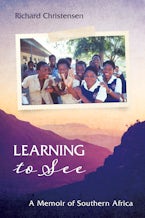- Home
- religion
- social science
- biography & autobiography
- Learning to See
Teaching in the southern African nation of Botswana in the early 1980s, Richard Christensen faced a new world, one endlessly fascinating and challenging. Experiencing warm hospitality from many people, sharing both joyful celebrations and painful struggles with students, he and his family encountered a deeper sense of the true meaning of community. Travel in apartheid South Africa and war-weary Zimbabwe gave him a fuller understanding of the reality of oppression and how people of faith endured their plight and kept hope alive. In this experience, so surprising in many ways, he came to a deepened realization of the genuine freedom of the gospel and the hope it affords us. He saw that relationships are what save us, that the salvation of God in Christ is not merely personal and individual, but communal, and that we are thus more dependent upon one another than we realize. Learning to see the world with new eyes, he discovered not only a more expansive vision of the church and the world, but also a more honest and complete understanding of himself as a product of an affluent and segregated society.
Richard Christensen has been a pastor, missionary, and a teacher of church history in the United Church of Christ over a period of fifty years. Author or co-author of four books, he has also published articles in The Journal of Presbyterian History, Interpretation, Religion and Education, and Christian Century.
“In Learning to See, Rich Christensen takes us back to a once-common literary form, the memoirs of a Christian missionary, and uses the discoveries he, his new wife, and his ten-year-old stepdaughter made of learning to appreciate a foreign culture and to see freshly how our own experiences as white, educated Americans both support us and trap us in a culture of freedom and affluence. This is a welcome addition to the genre.”
—William R. Wineke, Religion Editor, Wisconsin State Journal, retired
“This lovely memoir is a rare combination of spiritual insight, theological reflection, poignant interpersonal anecdotes, and political passion. It provides a nuanced critique of the implicit colonialism in many missionary movements in southern Africa without minimizing the value of spreading the gospel in word and deed. The chapters exhibit how a Christ-centered faith can generate an emancipatory political engagement with the world without reducing faith to a specific political program.”
—Lee C. Barrett, Lancaster Theological Seminary
Rich Christensen’s memoir . . . is warm and wonderful—‘magical’ is not too strong a word for the story and his telling of it. The church pushes or pulls us in contexts and relationships in which the living Christ becomes real to us in powerful ways. Such was the case for Rich and his family.”
—Anthony B. Robinson, author of Useful Wisdom











